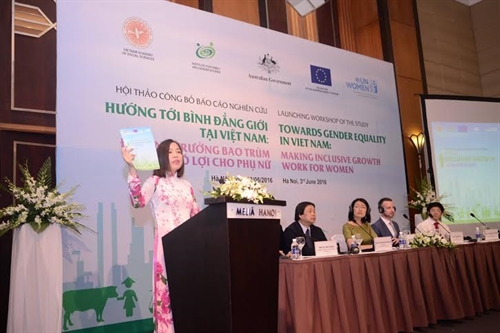 Society
Society

A new report released today warns of the possibility of a rise in gender inequality in Việt Nam.
 |
| The study “Towards Gender Equality in Việt Nam: Making Inclusive Growth Work for Women” being introduced to representatives at the conference. – Photo Courtesy of the UN Women |
HÀ NỘI – A new report released today warns of the possibility of a rise in gender inequality in Việt Nam.
According to the report, unless the country improves opportunities for women to get decent work and takes steps to reduce women’s roles in unpaid care and domestic work, gender inequality will only increase.
Launched in Hà Nội after one year of collecting data and analysis, the study “Towards Gender Equality in Việt Nam: Making Inclusive Growth Work for Women” was prepared by the United Nations Entity for Gender Equality and the Empowerment of Women (UN Women) and the Institute for Family and Gender Studies, Việt Nam Academy of Social Sciences, with support from the Australian government and the European Union.
Deputy Head of Mission at the Australian Embassy in Việt Nam Layton Pike said, “From agriculture to education, women and men engage differently across different sectors of the economy and may have different levels of access to resources and services.”
Policies and actions can be targeted to enable everyone to benefit equitably from socio-economic development, he said.
As the first comprehensive study looking into the economy through a gender lens, the study assessed Việt Nam’s current economic growth model and found that despite women contributing in large measure to economic development, the achievement of an inclusive growth model remains a challenge for the country.
UN Women Country Representative Shoko Ishikawa said, “Việt Nam’s current economic growth pattern is not giving adequate attention to ensuring women’s right to equally benefit from the growth is being fulfilled. If current policies and priorities are not reviewed and reformed from a gender lens, further economic integration will leave women behind.”
Prioritising gender equality should be at the core of the development policy. An investment in women is an investment in economic growth, she said.
The report notes that while a number of job opportunities have opened up for female workers in export-oriented manufacturing sectors, women are less likely than men to receive training and be promoted. The gender-earning gap has also widened. It also found that agriculture is still the main source of livelihood for a large portion of the population, particularly for women in the central-north and Central Highlands regions, but a large percentage of women work without pay on their family farms. This leaves them vulnerable, with limited opportunities to earn more secure incomes and become more productive.
Women also spend disproportionately more time on unpaid domestic work in comparison with men. The burden of unpaid work limits women’s access to economic opportunities and capacity to engage in paid work.
Associate professor Đặng Nguyên Anh, deputy director of the Việt Nam Academy of Social Sciences, said to achieve substantive equality, it was necessary to have policies that were inclusive for women and vulnerable groups. — VNS




